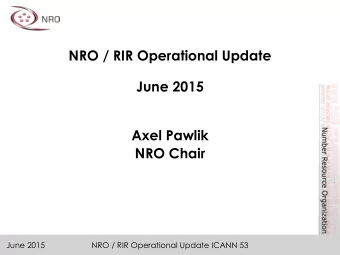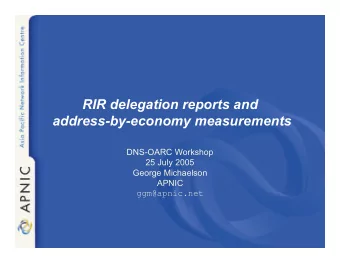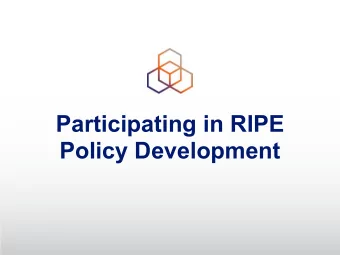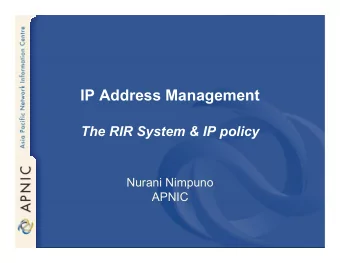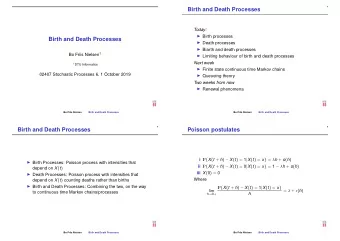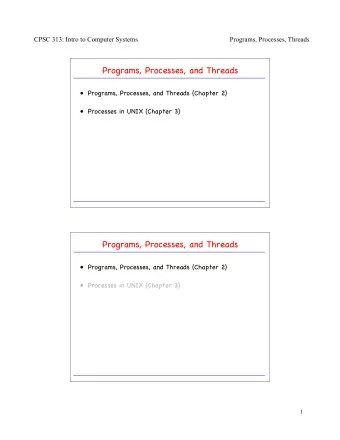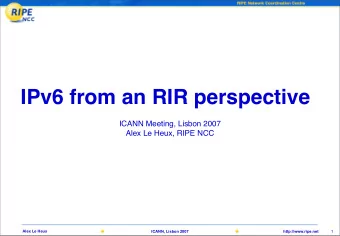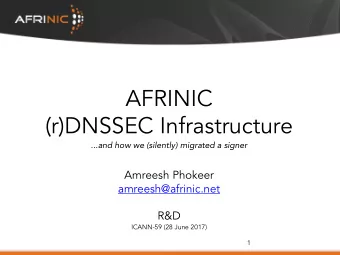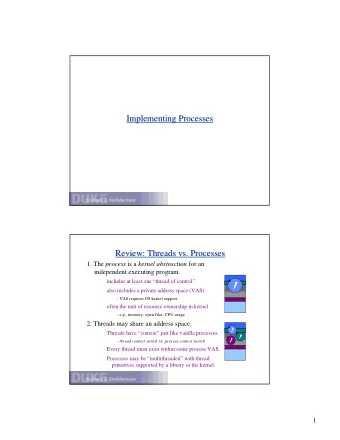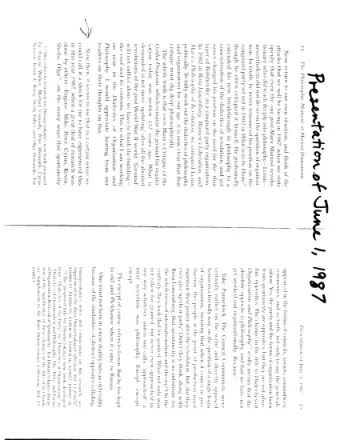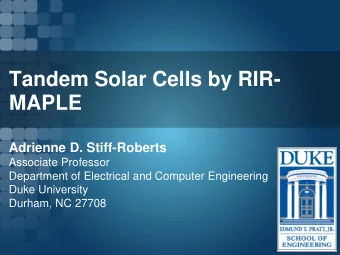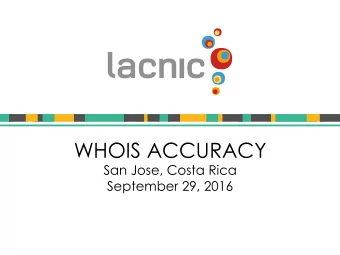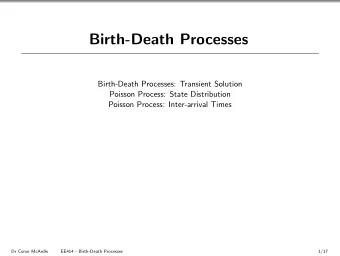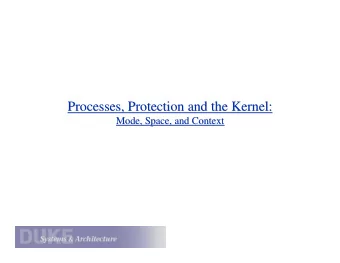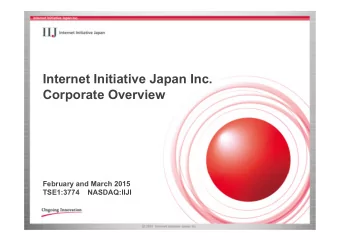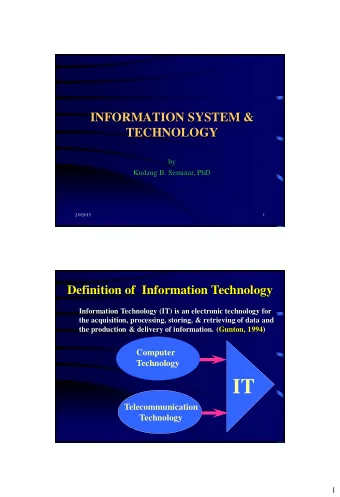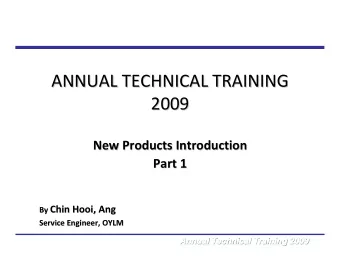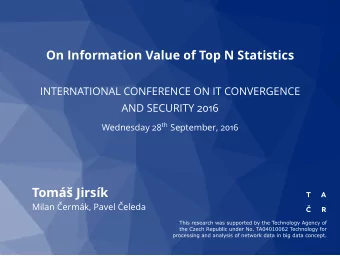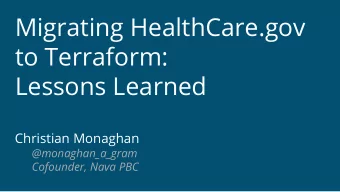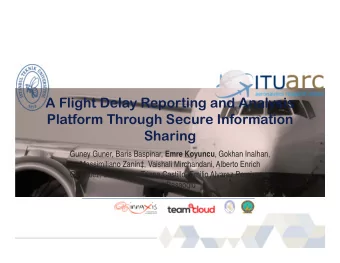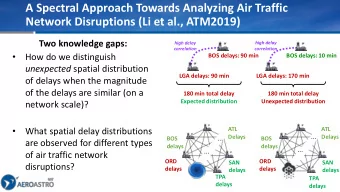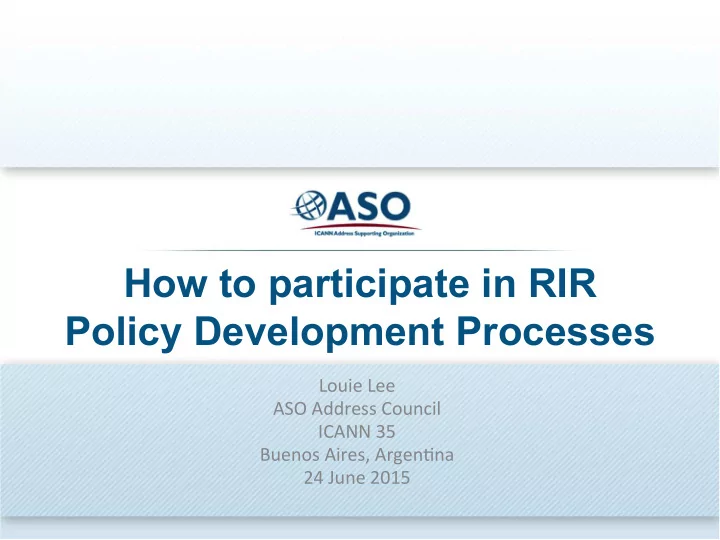
How to participate in RIR Policy Development Processes Louie Lee - PowerPoint PPT Presentation
How to participate in RIR Policy Development Processes Louie Lee ASO Address Council ICANN 35 Buenos Aires, Argen8na 24 June 2015 How to participate in RIR Policy Development Processes
How to participate in RIR Policy Development Processes Louie ¡Lee ¡ ASO ¡Address ¡Council ¡ ICANN ¡35 ¡ Buenos ¡Aires, ¡Argen8na ¡ 24 ¡June ¡2015 ¡
How to participate in RIR Policy Development Processes • ASO and ICANN • Number Resources – What are they? – Where do I get them? – What if I don’t qualify? • RIR PDP 2
ASO and ICANN ASO / ASO Address Council – Advise ICANN of IP addresses & ASN – Appoint 2 ICANN Board Members – Appoint members & participate in ICANN activities 3
Number Resources: What are they? • Internet number resources include Internet Protocol (IP) address space (both IPv4 and IPv6) and Autonomous System Numbers (ASNs). • An IP address is a numeric identifier that includes information about how to reach a network location through the Internet routing system. Every device directly connected to the Internet must have an IP address. Every IP address must be unique for devices to connect to the Internet and to each other. • An Autonomous System (AS) is a group of IP networks that use a single and clearly defined routing policy. ASNs are globally unique numbers used to identify these groups of networks. ASNs allow an autonomous system to exchange routing information with neighbouring autonomous systems. 4
Number Resources: Where do I get them? • You should first check with the Regional Internet Registry in your region. Each RIR community develops its own regional distribution policies. RIR policies generally set minimum criteria for networks that need Internet number resources. • If your network does not meet those criteria, you should approach an upstream provider, also known as a Local Internet Registry (LIR) or Internet Service Provider (ISP). • If your network does meet the criteria, you can get resources directly from the RIR. Some regions also have National Internet Registries (NIRs) that work with the RIR to provide resources in their countries. 5
Number Resources: Where do I get them? 6
RIR#COMPARATIVE#POLICY#OVERVIEW# March&2015 & (Version&201521)& ! The!goal!of!this!document!is!to!provide!a!comparative!overview!of!policies!across!the!Regional!Internet!Registry!(RIR)!system.!It!is! not!a!policy!statement!by!the!RIRs,!but!serves!as!a!reference!for!the!Internet!community.!While!this!document!was!accurate!on! the!date!of!publication!(13!April!2015)!it!may!be!outdated!by!subsequent!policy!implementations.!The!official!policy!documents! can!be!found!at!the!respective!websites!of!the!RIRs.!This!is!a!public!document!that!will!be!reviewed!and!revised!quarterly!through! the!coordinated!efforts!of!the!RIRs.!! For!more!information,!refer!to!the!AFRINIC,!APNIC,!ARIN,!LACNIC,!and!RIPE!NCC!websites.!! T ABLE#OF# C ONTENTS # 3 ! 1.!General! ...............................................................................................................................................................................................! 3 ! 1.1!Goals!of!the!RIR!System!...............................................................................................................................................................! 3 ! 1.2!Membership!.................................................................................................................................................................................! 4 ! 1.3!Allocation!Terms!and!Conditions!.................................................................................................................................................! 4 ! 1.3.1!Type!of!Custodianship!...........................................................................................................................................................! 5 ! 1.3.2!Transfer!of!Custodianship!.....................................................................................................................................................! 6 ! 1.3.3!Recovering!Unused!Resources!..............................................................................................................................................! 7 ! 2.!IPv4! .....................................................................................................................................................................................................! 7 ! 2.1!Initial!Allocation!...........................................................................................................................................................................! 8 ! 2.2!Subsequent!Allocations!................................................................................................................................................................! 9 ! 2.3!SubTAllocations! .............................................................................................................................................................................! 10 ! 2.4!Assignments!by!RIRs!(Independent/Portable)!...........................................................................................................................! 10 ! 2.4.1!General! ................................................................................................................................................................................! 11 ! 2.4.2!Critical!Infrastructure!..........................................................................................................................................................! 12 ! 2.4.3!Internet!Exchange!Points!(IXPs)!..........................................................................................................................................! 13 ! 2.5!Assignments!by!LIRs!(Aggregatable/NonTPortable)!...................................................................................................................! 13 ! 2.5.1!Assignment!Window!...........................................................................................................................................................! 13 ! 2.5.2!Dynamic!Addressing!............................................................................................................................................................! 14 ! 2.5.3!Mobile!Terminals!................................................................................................................................................................! 14 ! 2.5.4!Web!Hosting! ........................................................................................................................................................................! 14 ! 2.5.5!Network!Address!Translation!(NAT)! ....................................................................................................................................! 14 ! 2.5.6!RFC1918!Private!Address!Space!..........................................................................................................................................!
Number Resources: What if I don’t qualify? • Check with LIR or ISP • Change policy to meet your needs 8
Global Policy Development • Each region has its own policy development process – All open, transparent, and bottom-up • Global policy proposals are submitted in all 5 regions • Each region follows its own process • It then gets passed to the NRO for review • And forwarded to the ICANN board 10
Number Policies: June 2015 Snapshot 11
Number Policies: Summaries • About 30 proposals in various states of discussion at 5 RIRs – Under Discussion (17) – Last call (1) – Ratified (8) - recently or soon to be implemented – Abandoned (4) 12
Number Policies: Topics • Autonomous System Numbers (2) • DNS (in-addr.arpa) (1) • IPv4 (9) • IPv6 (4) • Policy Development Process (1) • Region of Use (3) • Transfers (10) 13
Number Policies: Highlights • RIPE soon to implement Inter-RIR IPv4 transfer policy (along with ARIN and APNIC which already have this policy) – Inter-RIR proposal at LACNIC under discussion • “Region of Use” proposals at AFRINIC and ARIN. – Why? Because IPv4 free pool has run out. And, there is ambiguity about IPv6. • IPv4 proposals for anycast and critical infrastructure (Internet exchange points) – Easier access to number resources (anycast - AFRINIC) and holding reserves (for CI – AFRINIC and ARIN) 14
Number Policies: Links to Full Listings • AFRINIC Proposal page: http://www.afrinic.net/en/community/policy-development/policy-proposals/ • APNIC Proposal page: http://www.apnic.net/community/policy/proposals • ARIN Proposal page: https://www.arin.net/policy/proposals/ • LACNIC Proposal page: https://politicas.lacnic.net/politicas/list • RIPE Proposal page: http://www.ripe.net/ripe/policies/current-proposals/current-policy-proposals 15
Number Policies: Participation • Public Policy Meetings – 14 meetings being held around the world yearly usually in conjunction with network operators – Open to all interested parties – Attend in-person or via remote participation means • Mailing Lists – AFRINIC: https://lists.afrinic.net/pipermail/rpd/ – APNIC: http://mailman.apnic.net/mailing-lists/sig-policy/ – ARIN: http://lists.arin.net/pipermail/arin-ppml/ – LACNIC: http://mail.lacnic.net/pipermail/politicas/ – RIPE: https://www.ripe.net/ripe/mail/archives/address-policy-wg/ 16
Thank you Questions?
Recommend
More recommend
Explore More Topics
Stay informed with curated content and fresh updates.
